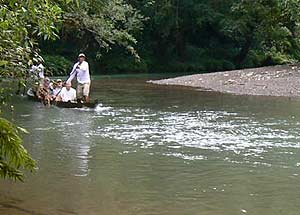 Visiting Colombia’s remote and rarely visited Pacific coast last week, we met a man who has worked to help local people there become responsible and promote entrepreneurship. It’s an uphill battle, Guillermo Gomez told us, as we sat having coffee in the open air ramada where he keeps the motorboats that ferry passengers to his resort.
Visiting Colombia’s remote and rarely visited Pacific coast last week, we met a man who has worked to help local people there become responsible and promote entrepreneurship. It’s an uphill battle, Guillermo Gomez told us, as we sat having coffee in the open air ramada where he keeps the motorboats that ferry passengers to his resort.
“Nobody wants to be the chief here, it’s a throwback to the days of slavery, which were just four generations ago,” he said. It’s very difficult for people here to be comfortable being in charge, or telling other locals what to do. Sometimes I will pay a fisherman 400,000 pesos ($242) for a big load of fish, and the next day, they’ll come back to me and say they have no money. They’ve spent the whole thing on beers for their friends, or in one guy’s case, his wife’s card-playing habit. People don’t ever save money, or really get the concept of building a business or investing in something. It’s very slow, a very slow process.”
Guillermo tries to introduce the concept of entrepreneurship, such as with a former employee to whom he sold one of his old boat motors. Giving it to him would have made him look bad, so he sold it to him. Now this man has his own boat taxi service with two boats and motors, ferrying people around between towns. There are no roads, so this is really the only way you can travel, besides hiking the shoreline at high tide.
Guillermo also encouraged some other locals in a nearby village to develop a business taking tourists up a shallow river in their dug-out canoes to a beautiful waterfall and pool that is spectacular and memorable. Before his was taking them only as far as the motorboats could go, now tourists get down in very low dugouts and are poled the rest of the way. It’s a blissful cruise with the sounds of the squawking parrots and the rushing water that almost comes into the boats.
While he encouraged the boatmen, eventually the local NGO told him that ‘no Paisas were allowed to be involved with new ventures like this.’ Paisas are the people from Medellin, also known as whites.
This didn’t bother Guillermo, who understands the sensitivity here between the tiny fraction of the population who have ten times the money as everybody else. “I’m just happy that there is this new tour that my guests can enjoy and that local people are benefitting,” he said.
 Visiting Colombia’s remote and rarely visited Pacific coast last week, we met a man who has worked to help local people there become responsible and promote entrepreneurship. It’s an uphill battle, Guillermo Gomez told us, as we sat having coffee in the open air ramada where he keeps the motorboats that ferry passengers to his resort.
Visiting Colombia’s remote and rarely visited Pacific coast last week, we met a man who has worked to help local people there become responsible and promote entrepreneurship. It’s an uphill battle, Guillermo Gomez told us, as we sat having coffee in the open air ramada where he keeps the motorboats that ferry passengers to his resort.